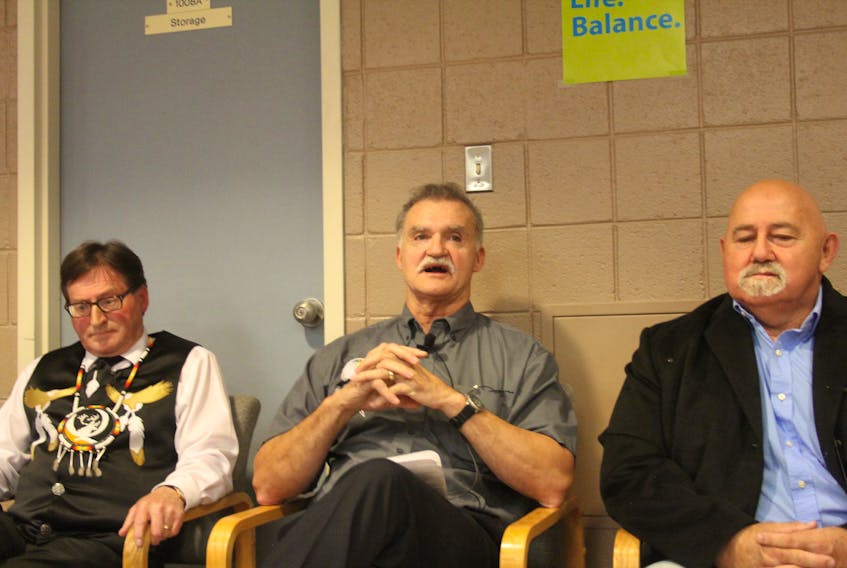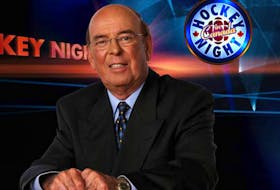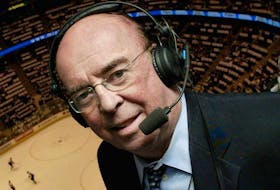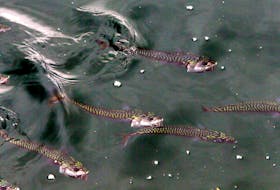The Qalipu First Nations held a public debate Wednesday evening, where the three candidates currently running for Qalipu chief — current chief Brendan Mitchell, Clyde Russell, and Hayward Young — were posed a series of questions by moderator Glenn Wheeler over the course of 90 minutes.
The debates began with each candidate taking five minutes to state the reason why they were running for chief, and to pinpoint their respective platforms.
Mitchell kicked off the night by stating that he was much more interested in taking Qalipu forward, then looking back at the band’s past.
“We have a lot of work left to do in many areas,” Mitchell said, identifying education and health specifically.
Russell, a candidate who admitted a lack of cultural experience within the First Nations community, stated that he decided to run after a number of people within the First Nations community approached him about it.
“They approached me because we needed leadership,” Russell said. “And they thought I had the ability, the skills, and the background to provide that leadership.”
Russell went on to state that he spent significant time fighting in the Armed Forces, and if serving his country was the reason why he didn’t have the time to take in more First Nations experiences in past years, he wasn’t going to apologize for it.
Hayward Young began his five-minute address to the public by acknowledging that what he had to say was going to be controversial, but that it had to be said. Young stated that the recently-signed supplemental agreement by Qalipu First Nations had two versions, with the first version being lobbied against by Mitchell, because if it had gone through, it would have left Mitchell without a membership.
“If it was anyone who took care of themselves,” Young said, “you did,” referring to Mitchell.
Young finished his address by stating he wasn’t asking for a vote, but inviting voters to put their voice out there, and to put pressure on the band to remain transparent within the community.
Mitchell responded to Young’s claim about the supplemental agreement by stating that if he replied in full to the claim, it would force Young to resign from the race. This wouldn’t be the first clash between Mitchell and Young on the night.
Wheeler opened up the conversation by addressing a single candidate with a question, giving that candidate a few minutes to provide an answer, and then allowing the remaining two candidates five minutes of shared time to muster a response. It was often during these five-minute responses where Young and Mitchell sparred, taking opposing views on multiple topics.
One such topic was the notion of a forensic audit. Young admitted the cost for such an audit would be extreme, but that the band has money that is “just floating around,” and would require a proper audit to recognize where exactly the band’s money was being spent.
Mitchell rebuked this claim, stating the band had an independent audit that proved the band’s financial record was rock solid. Mitchell said that the Qalipu First Nations Band scored the lowest on a risk assessment for similar bands throughout the country, three years in a row.
When the microphone turned to the public, several audience members chose to address the recent problem of 100,000 Canadian citizens with First Nations status having their status rebuked.
Mitchell was addressed this question personally, to which he responded by saying the band would keep at the federal government forever, until the people who had lost their statuses were awarded them back. However, while Mitchell alluded to heated negotiations between himself and members of the federal government, Russell demanded to know what exactly was being done for the people who had lost their statuses.
The notion that this issue would be dragged out between all parties involved was held in mutual agreement between the other two candidates. Russell stated that the best way to address the Canadian government was to address them as a single body of 17,000 voters.
The debate ended Wednesday evening with a question from the public regarding communication with the disenfranchised members of the Qalipu community, and communication between members of the community who are not publically active.
Russell stated that it would be the inclusive behavior of the community that led to any problems with communication between disenfranchised members of the community and Qalipu, and all three candidates seemed in agreement that avenues could be opened up between the band, its members, and potential members.









